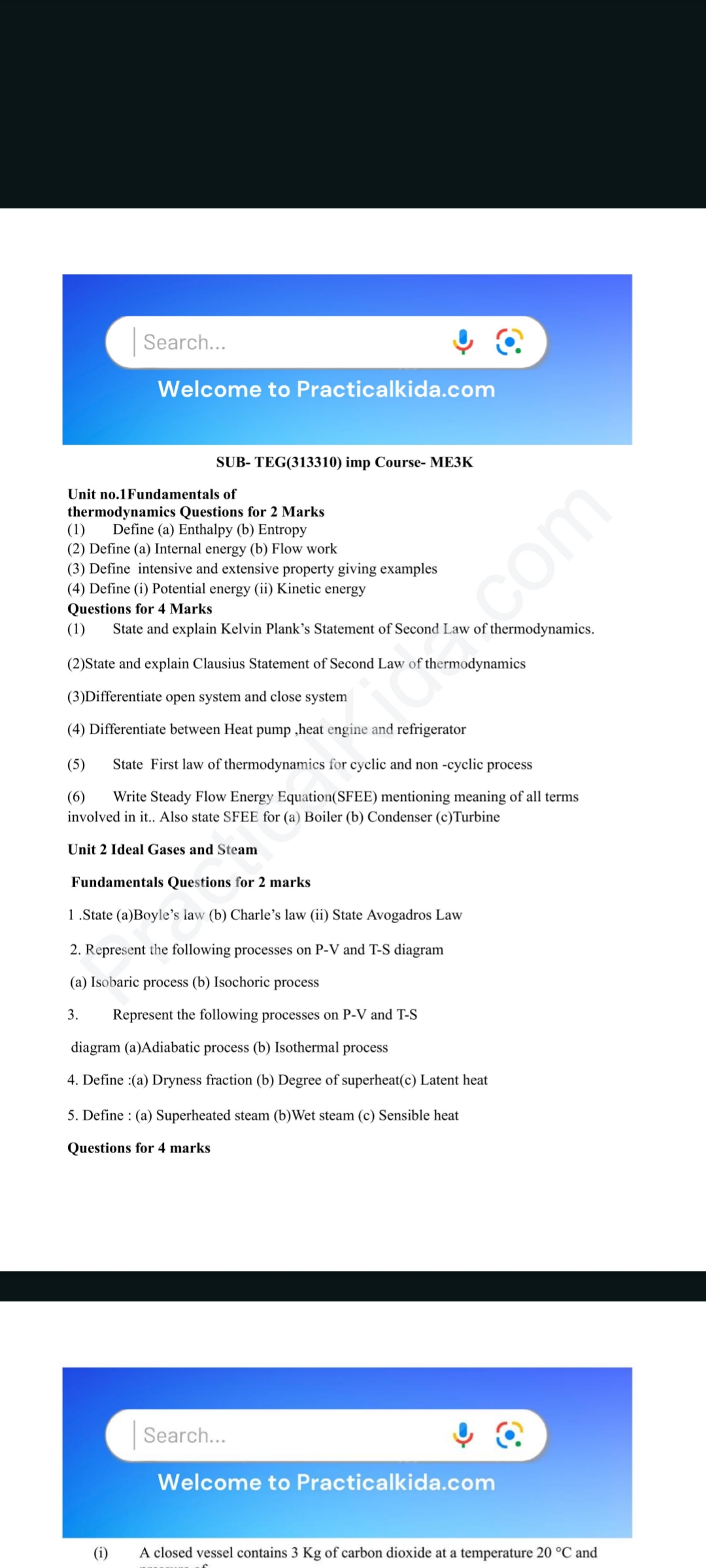(1) Define (a) Enthalpy (b) Entropy (2) Define (a) Internal energy (b) Flow work (3) Define intensive and extensive property giving examples (4) Define (i) Potential energy (ii) Ki... (1) Define (a) Enthalpy (b) Entropy (2) Define (a) Internal energy (b) Flow work (3) Define intensive and extensive property giving examples (4) Define (i) Potential energy (ii) Kinetic energy Questions for 4 Marks (1) State and explain Kelvin Plank’s Statement of Second Law of thermodynamics. (2) State and explain Clausius Statement of Second Law of thermodynamics (3) Differentiate open system and close system (4) Differentiate between Heat pump, heat engine and refrigerator (5) State First law of thermodynamics for cyclic and non-cyclic process (6) Write Steady Flow Energy Equation (SFEE) mentioning meaning of all terms involved in it. Also state SFEE for (a) Boiler (b) Condenser (c) Turbine Unit 2 Ideal Gases and Steam Fundamentals Questions for 2 marks 1. State (a) Boyle’s law (b) Charle’s law (ii) State Avogadro’s Law 2. Represent the following processes on P-V and T-S diagram (a) Isobaric process (b) Isochoric process 3. Represent the following processes on P-V and T-S diagram (a) Adiabatic process (b) Isothermal process 4. Define (a) Dryness fraction (b) Degree of superheat (c) Latent heat 5. Define: (a) Superheated steam (b) Wet steam (c) Sensible heat Questions for 4 marks (i) A closed vessel contains 3 Kg of carbon dioxide at a temperature of 20 °C and pressure of 5 bar.

Understand the Problem
The question consists of a set of thermodynamics problems that pertain to various fundamental concepts, indicators, and laws in the field. These involve definitions, explanations, differentiations, and representations related to thermodynamics and steam.
Answer
1. **Enthalpy**: Total energy; **Entropy**: Disorder measure. 2. **Internal Energy**: Energy in a system; **Flow Work**: Energy to move fluid. 3. **Intensive Property**: Independent, e.g., temperature; **Extensive Property**: Dependent, e.g., volume. 4. **Potential Energy**: Due to position; **Kinetic Energy**: Due to motion.
-
Enthalpy: A measure of total energy in a thermodynamic system, consisting of internal energy and the product of pressure and volume.
Entropy: A measure of disorder or randomness, representing the number of ways a system can be arranged.
-
Internal Energy: The total energy contained within a system, due to the kinetic and potential energy of molecules.
Flow Work: The work required to move a fluid into or out of a control volume.
-
Intensive Property: Independent of the amount of substance. Examples include temperature and pressure.
Extensive Property: Depends on the amount of substance. Examples include volume and mass.
-
Potential Energy: Energy possessed by an object due to its position or configuration.
Kinetic Energy: Energy an object possesses due to its motion.
Answer for screen readers
-
Enthalpy: A measure of total energy in a thermodynamic system, consisting of internal energy and the product of pressure and volume.
Entropy: A measure of disorder or randomness, representing the number of ways a system can be arranged.
-
Internal Energy: The total energy contained within a system, due to the kinetic and potential energy of molecules.
Flow Work: The work required to move a fluid into or out of a control volume.
-
Intensive Property: Independent of the amount of substance. Examples include temperature and pressure.
Extensive Property: Depends on the amount of substance. Examples include volume and mass.
-
Potential Energy: Energy possessed by an object due to its position or configuration.
Kinetic Energy: Energy an object possesses due to its motion.
More Information
Enthalpy, entropy, internal energy, and flow work are fundamental concepts in thermodynamics. Intensive and extensive properties distinguish between properties independent or dependent on substance quantity.
Tips
Confusing intensive and extensive properties is common. Remember, intensive properties do not change with the quantity of matter.
Sources
- Intensive and Extensive Properties - Definition, Examples with Videos - byjus.com
- What is Internal Energy? - Definition, Formula, Equation & Examples - byjus.com
- Enthalpy - Wikipedia - en.wikipedia.org
AI-generated content may contain errors. Please verify critical information